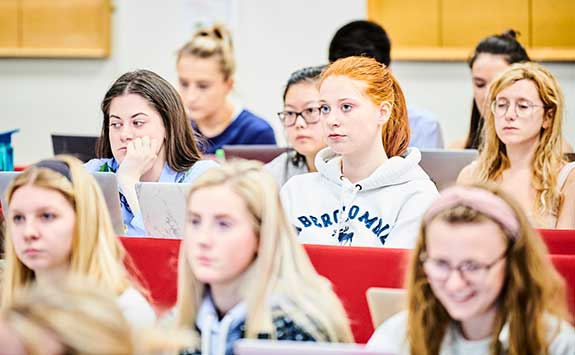Pre-arrival information
Welcome!
As you are getting ready to start on your postgraduate studies in September, you may be curious as to what the experience will be like.
The purpose of these web pages is to give you an idea of what it will be like to study in the UK generally, and Newcastle Law School in particular. These pages include various resources which explain what is expected of our students and make recommendations to help you prepare before your arrival at the Newcastle Law School.
In the following brief presentations, we will give you an overview of what academic life is like for students at Newcastle Law School and what is expected of our students.
How is student progress assessed?
Student progress at Newcastle is assessed through a combination of written exams and essays. While exams involve revising the material you will have been taught previously, essays require answering a research question, which you will be expected to research and address on your own.
What is expected of our students in assessment?
As teaching at Newcastle Law School is fundamentally research-led, all assessment will require you to utilise your own research skills. In fact, a large part of your degree will be taken up by a dissertation. Here, you will be expected to identify a research question of your own. The purpose of the dissertation is to give you the opportunity to develop expertise in a specific area which may interest you personally, academically, or professionally.

But what does ‘research’ mean?
Doing legal research means that you will be expected to not only investigate and understand the law that applies to a particular issue, but also to find out what are the problems that arise from how the legal rule is expressed and how it is applied in practice.
To do this, you will be expected to find out what other scholars have identified as being problematic in the law and its application. You will also be expected to explain whether you agree or disagree with the views of other scholars and provide your reasons as to why you agree or disagree with them.
In other words, legal research means that you will be expected to critically analyse not only the law itself, but also the ideas of others. The purpose of this is to arrive at your own conclusion as to the state and operation of the law, which you will be expected to explain and defend.

What is the day-to-day studying experience on the LLM?
The LLM involves a lot of independent learning. In fact, most of your time on the LLM will be taken up by independent study. For instance, you will be expected to read through many materials every week as preparation for both lectures and seminars. Independent study will also be required when researching for your various assessments.
Therefore, you will be required to multi-task, self-motivate and manage your time effectively to make the most out of the next 12 months.
Another major component of the LLM experience is a constant discussion of ideas whose purpose is to encourage original thought in our students. This means that you will be expected to critically analyse not only the legal rules but also the ideas of others. More importantly, you will be constantly encouraged to develop your own ideas and express your own opinions on all matters taught on the curriculum.

What academic skills do I need as an LLM student?
As an international student, you may have picked up on some differences between teaching, learning and assessment in your home country and Newcastle Law School. Certain terms like ‘independent learning’ and ‘critically analyse’ may seem unfamiliar to you if you are from a country where fact-based learning and exam assessments are the main focus. Being expected to speak up and share your ideas in small seminar groups may be new to those of you used to learning in large lectures. However, you may also find that you already possess many of the academic skills needed but are used to using them in different ways or hearing them called other things.
This page further explains some of the academic skills you’ll be expected to develop and demonstrate in order to successfully complete your LLM degree.
What is 'Independent Learning'?
The expectation that you will be an independent learner is the skill that defines UK academic culture. This means being independent in two main ways – managing your own learning and thinking independently to formulate your own ideas. Our video below explains more about what this means.
What is 'Critical Thinking'?
UK academic culture emphasises active learning where you are expected to develop and express your own thoughts and judgments on the ideas you encounter. You’ll often hear this referred to as ‘critical thinking’ or ‘critical analysis’ and it’s a vital professional skill for working in law where you’ll be expected to bring together and analyse evidence in order to inform your own decision-making.
Our video below explains what ‘critical thinking’ means and the ways you might see it reflected in your learning and assessments at university.
Critical thinking might be something you are already familiar with from your previous study but you may have heard it called something else such as ‘logic’ or ‘reasoning’. However, it may be new to you if you have come from an academic background where you are assessed on how much ‘knowledge’ you have of your subject. This might mean your assessments primarily tested whether you could remember and repeat information given to you in lectures. Whilst this kind of high-level memorization is still very valuable for studying in the UK at postgraduate level, your lecturers will be looking to see evidence of what you can do with those facts. This is reflected in the kinds of questions you’ll be asked for essays and exams where the emphasis is on solving a problem, taking a position or presenting an argument based on the evidence you have read.
Expressing your position like this can sometimes feel difficult or uncomfortable if you’re used to seeing other researchers’ ideas as authoritative. Engaging in seminar discussions where you have the chance to share your thoughts and discuss them with others can be a good way to build your confidence around communicating and backing up your ideas.
Next steps: What skills do I need to prepare for studying in the UK?
The LLM is assessed almost exclusively in writing. Therefore, if English is not your first language, you should first become familiar with written English as soon as possible.
Here are some ways to help you with this:
- If you do not already do this, you could start by getting used to browsing the internet in English, including changing the language of your internet browser into English. Getting used to browsing the internet in English is essential, because all reading and research for the next 12 months will be done in English and using the internet and online legal databases will be a routine part of this process. Therefore, becoming used to navigating the internet in English will make reading and research a far easier and more rewarding experience.
- Read as many materials in English as you can. There is no ‘best’ way to go about this. You are not expected to prepare on the ‘law’ aspect of your studies. At this stage your purpose is simply to become used to reading in English. To do this you could read anything from online blogs to magazines to comics to books. Read anything that you like and holds your interest long enough to encourage you to continue reading.
Click the buttons below for some resources which you may find useful for this purpose.
The LLM will require you to assess and build on your academic and information literacy skills. We would encourage you to take some time before the programme starts to reflect on the skills you already have and those that you need to work on.
Here are some ways to help you do this:
- Self-assess your information literacy skills by completing our postgraduate skills audit. This activity only takes 10 minutes to complete and it will give you an overview of your skills strengths and weaknesses. Your results are anonymous and you can save them as a pdf to refer back to. Take the time to read through your results and follow the links provided.
- Browse the Academic Skills Kit website to get a head start on what skills you will be required of you at a UK university and how you can start to develop these.

